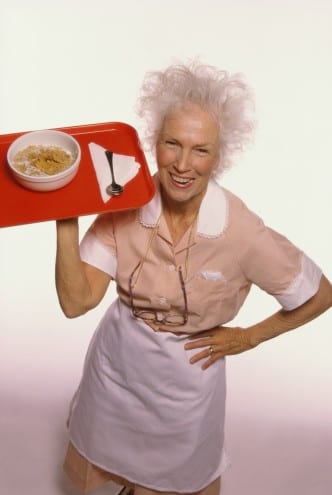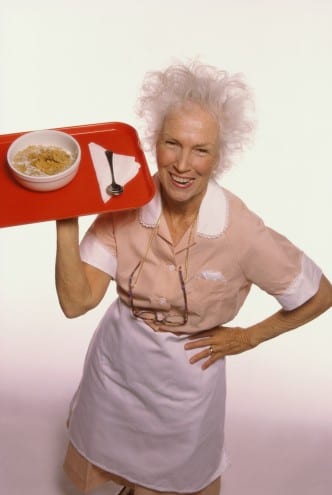 I’ve had a few strange service experiences lately. One was at a pizzeria (reviewed this week), and one was at a barbecue joint. The service at the pizza place was pretty cut-and-dried “slow.” No debate there. But my service issue at the ‘que joint was more puzzling, to-wit: My waiter offered a lot of opinions and facts I didn’t ask for. First, he explained that (another publication) had “already” praised two of the items on the menu as among its “top picks.” (“I would be more impressed if that publication didn’t list everything in town as one of its top picks,” my dining companion smirked.) Later, with every order we made, we were met with the following affirmation: “Excellent choice.” Now, it wasn’t like we were smartly pairing a Sauterne with trout almandine — we were just picking three of five side dishes to go along with our barbecue, and a few apps and desserts. The menu wasn’t big enough to have outright losers, it seemed; did I really need his approval?
I’ve had a few strange service experiences lately. One was at a pizzeria (reviewed this week), and one was at a barbecue joint. The service at the pizza place was pretty cut-and-dried “slow.” No debate there. But my service issue at the ‘que joint was more puzzling, to-wit: My waiter offered a lot of opinions and facts I didn’t ask for. First, he explained that (another publication) had “already” praised two of the items on the menu as among its “top picks.” (“I would be more impressed if that publication didn’t list everything in town as one of its top picks,” my dining companion smirked.) Later, with every order we made, we were met with the following affirmation: “Excellent choice.” Now, it wasn’t like we were smartly pairing a Sauterne with trout almandine — we were just picking three of five side dishes to go along with our barbecue, and a few apps and desserts. The menu wasn’t big enough to have outright losers, it seemed; did I really need his approval?
Which got me thinking: Was my bristling at unsolicited banter my problem? Or is there a preferable way to wait on patrons?
The answer is, it depends.
“The answer is totally dependent on the price-point of the restaurant,” says Karel Anne Berry Tiezen, a veteran of the food industry. “At TGI Fridays, I expect the chatty waiter who is happy about everything ordered. Otherwise I am looking for ‘Have you dined with us previously?’ and gauge the response to determine the amount of info or approval needed by the patron.”
Price seems a fair decision-point. One Dallasite with experience in the North Texas food scene who asked not to be named found one of the area’s hottest new restos a service disaster.
“We went to Uchi a few weeks ago and had the dumbest waiter ever,” she states. “I understand that the menu is extremely fresh and rotates often, and we ordered the omikase [chef’s tasting menu], which I know can complicate the server’s life, but no one knew jack. Plates came [but] nothing was explained, [even though] I asked for explanations for each dish and every single person had to refer to notes. I don’t know a ton about Japanese cuisine, and when I’m paying that much, I want to be educated.”
Educated, though, doesn’t mean meaningless platitudes.
“I’ve noticed most waitstaff say something positive to anything you order,” says John Anderson. “This one waitress in Shreveport said, “good deal!’ so many times at our table, we looked at each other in bewilderment. Sometimes I will order something and the waiter will chime in and suggest an off-the-menu change they like such as adding a different sauce or meat. I do trust their opinion usually when this happens but it makes me feel sort of uncomfortable when I don’t like the suggestion and go for the original recipe.”
“Our waiter threw around ‘most popular’ and ‘award winning’ — no reference to which award, mind you — when we were considering omikase vs a la carte. I was totally put off. If I wanted a ‘most popular’ dish, wouldn’t I be eating southwestern egg rolls at a fuckin’ Chili’s?” stresses our unhappy Uchi diner.
“I don’t want the ‘this is popular’ speech in regards to waiter feedback, but I do respect it when they are honest and say, ‘I don’t really think you want that dish,’ whether that is because they have personally experienced it or have had enough patron feedback to know not to recommend it,” offers up Dallas Voice’s fashion writer Denton Bricker. Adds Anderson, “The only time I’ve ever heard waiters say anything negative is when I’ve asked their opinions directly … in which case I would expect them to candidly give me their thoughts on a dish.”
“I’m very picky and there is a lot I don’t eat, such as beef or shrimp. If I want the server’s input, I usually pick two or three dishes I find interesting and ask which of those items they might suggest,” says John Jones. Tom Stewart echoes that sentiment: “I only care if I actually ask for a recommendation when I can’t decide between a couple of dishes that sound equally delicious,” he says.
Are you being served: What do diners expect from chatty waitstaff?


